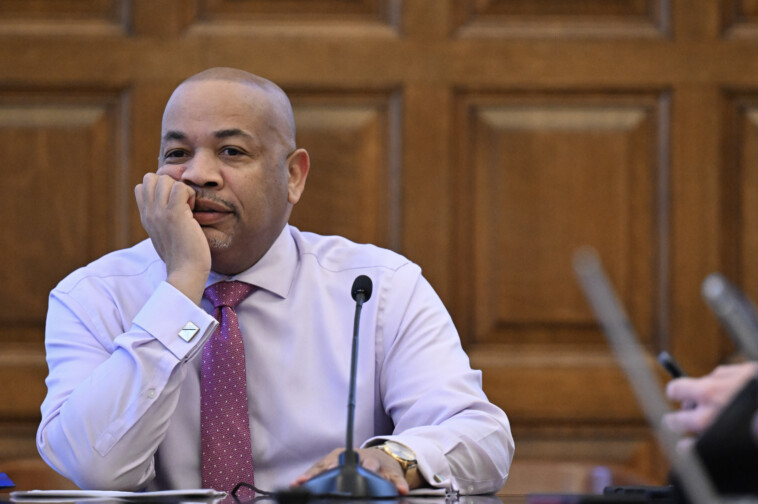Let’s make a whatever-you-call-it.
Gov. Kathy Hochul acknowledged Wednesday that lawmakers had reached a breakthrough in negotiations to revamp the state’s discovery laws — even as she insisted it didn’t count as a “deal.”
The governor instead opted for wonky jargon, describing the end of a budget stalemate revealed the day before by Assembly Speaker Carl Heastie (D-Bronx) as a “conceptual agreement” different from a done deal.
“I think we’re very, very close to being done and perhaps, today will be the day we say, ‘Pens are down,’” Hochul said during a news conference.
Hochul plans to meet with Heastie and Senate Majority Leader Andrea Stewart-Cousins (D-Westchester) Wednesday evening.
A deal — or a deal by another name — likely will clear a major logjam to passing New York’s massive $252 proposed budget, which has been held up for weeks by Hochul refusing to budge on her policy asks, especially changes to discovery
Hochul stopped short of voicing support for the plan crafted by Albany Democrats and approved by all five New York City district attorneys.
But rumors swirled around Albany after the deal was announced Tuesday that it was falling apart, prompting Heastie to clear the air.
“Everything is still fine conceptually. Staff is going back and forth on drafting,” Heastie told The Post.
While Hochul contended there’s no deal over discovery, last year she unveiled the state budget deal by calling it the “parameters of a conceptual agreement” — almost the exact same term Brooklyn District Attorney Eric Gonzalez used to describe the state of play on discovery.
Changing discovery laws was one of Hochul’s big priorities in the budget talks with state lawmakers, along with making it easier to involuntarily commit mentally ill people — a pair of policy pitches that grew from public safety concerns in the Big Apple.
The city’s DAs, including Manhattan District Attorney Alvin Bragg, argued that the state’s 2019 discovery reforms led to a surge in criminal case dismissals based on often-trivial technicalities.
Hochul backed their proposal to tweak the laws, narrowing the scope of evidence prosecutors have to turn over to defense attorneys and setting a 35-day time limit to challenge violations.
Critics such as The Legal Aid Society, however, pushed lawmakers to stand firm against the changes — contending they’d give prosecutors too much power. They also argued the surge in dismissals is largely seen in New York City and stems from the NYPD failing to share evidence with prosecutors.
Despite the pushback, Heastie said Tuesday that Dems had reached a “framework” over discovery changes.
The deal would:
- Require prosecutors to just turn over evidence “relevant” to charges, narrowing it from evidence “related” to the case,
- Clarify that judges should only dismiss cases in which prosecutors did not exercise “due diligence,”
- Require defense attorneys to file discovery challenges within 35 days of prosecutors certifying to the court they’ve turned over evidence.
Three of New York City’s district attorneys — Gonzalez, Bragg and Staten Island’s Michael McMahon — flanked Hochul during her news conference, which was part of a tour pushing for the discovery changes.
Gonzalez said the legislative teams from the DAs and Heastie’s and Stewart-Cousin’s offices were crafting the actual language for changes.
“Every word matters in a statute, because if a word is off or a standard is off, it changes the entire interpretation,” he said.
“We want to make sure that the language is clear that judges will have discretion to independently and individually review each case, and that a judge would not feel that they have to dismiss a case because a document is missing.”




